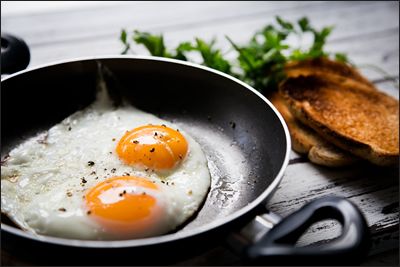How To Eat Less By Eating More Protein

If you keep up with the latest in dietary advice, you can probably list a few reasons why protein is such an important nutrient. It’s necessary, of course, to help you build and maintain your muscle mass. And it’s also known to be a much better at filling you up than either fat or carbohydrate. That’s why we suggest that people aim to have a good source of protein at each meal or snack. The idea is simply this: high-carb meals don’t stay with you, while higher protein meals can help control hunger from one meal to the next. But here’s something else: a recent study suggests that a high protein breakfast not only helps control your appetite until the next meal, it might reduce unhealthy snacking in the evening.
How Protein Measures Up
Teenagers are notorious breakfast-skippers, and that breakfast skipping is associated with weight gain. Researchers at the University of Missouri studied the effects of different breakfast meals in 20 overweight teenage girls - who typically ate breakfast no more than twice a week.
The girls were asked to do the following, in no particular order: One week, they skipped breakfast each day, one week they had a high-protein breakfast every day (35 grams), and one week they had a lower protein breakfast every day (13 grams). What the researchers wanted to know was how the different meals affected their appetite, hunger levels between meals, food cravings and evening snacking.
The results showed that the high-protein breakfast had several advantages over the low-protein one (and certainly over no breakfast at all). For one thing, the girls said the high-protein breakfast was more filling - no surprise there. But during the week that they ate the high-protein breakfast, their brain activity was different. There was less activity in the areas of the brain responsible for food cravings - and the girls ate less high-fat, high-sugar foods after dinner.
This is an interesting twist on the whole story. It suggests that a high-protein breakfast not only helps keep you full until lunch but may even help curb your intake over the course of the day. Getting in 35 grams of protein at one time, as they did in the study, might be a bit of a challenge. But you can get close - 25 grams is actually fairly easy to do.
Want to Up Your Protein at Breakfast?
Forget about any type of cereal if you want a high protein breakfast. Despite claims, the most protein you may get from a serving of cereal is 8 grams.
Here are some meals to try, all of which will give you about 25 grams of protein.
- A protein shake with nonfat milk. A portion of milk provides about 10 grams of protein, and you can adjust the protein powder in your shake to boost the protein up
- A portion of plain nonfat cottage cheese with fruit and a handful of almonds
- An omelet made with 2 whole eggs or 4 egg whites, filled with veggies and an ounce of low fat mozzarella cheese
- Cook rolled oats in nonfat milk then top then stir in protein powder after it’s cooked. Top with a dab of almond butter
- Spread some nonfat cream cheese on 100% whole grain toast and top with 3 ounces smoked salmon
Of course, this is only one recent study, and its conclusions are not yet the state of the science on this topic. But there is good support in the scientific literature for the general proposition that protein intake under the right circumstances produce feelings of satiety.
Based on an article by Susan Bowerman - Herbalife Director, Worldwide Nutrition, Education & Training.

